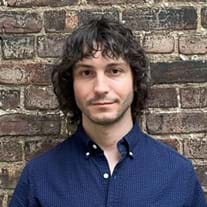
Jonathan Gill, PhD
2023 Leon Levy Scholar
New York University Langone Health
Institution
New York University Langone Health (Advisor: Dr. Dmitry Rinberg)
Sub-disciplinary Category
Systems Neuroscience
Previous Positions
- BA, New York University
- PhD, New York University (Dr. Dmitry Rinberg and Dr. Robert Froemke)
Bio
Dr. Jonathan Vernon Gill is a postdoctoral fellow in the lab of Dr. Dmitry Rinberg at NYU Langone Health. His research explores how coordinated neural activity gives rise to perception and action, particularly odor guided behavior. Previously, Dr. Gill completed his B.A. in Psychology from New York University (NYU), before training as a research assistant in the labs of Dr. George Alvarez at Harvard University, and Dr. Ann Graybiel at MIT. Dr. Gill returned to NYU to pursue his PhD in the labs of Dr. Robert Froemke and Dr. Dmitry Rinberg where he developed methods for holographic 2-photon optogenetic stimulation of precisely targeted sets of neurons, using this technique to generate ‘synthetic percepts’ through patterned neural activity. As a Leon Levy Scholar, Dr. Gill extends this approach with sensitive behavioral measures, large-scale imaging, and computational modeling to identify the neural coding features that causally contribute to the perception of odor identity.
Research Summary
Distinguishing the neural circuits that are correlated with odor identity and behavioral choice
Technical Overview
Our brain’s ability to encode information we detect from the use of our senses and to subsequently read out this information to drive our behavioral choices is essential for survival. However, these two processes are largely examined separately, and thus, it remains unclear exactly which features of the neural activity that carries sensory information are read out to form sensory percepts and guide behavior. Through the use of 2-phonton holographic optogenetic photostimulation, a new cutting-edge methodology he pioneered, Dr. Johnathan Gill will be examining the mouse olfactory bulb to identify which cells may underly odor-guided behavior and to determine the causal contribution of these neural features for developing percepts of odor identity. His work will have implications for not only olfactory processing, but for the processing of information across all sensory systems more broadly. It will also have practical implications for next-generation brain computer interface technology, potentially informing researchers which neural features to target to maximize the therapeutic potential of sensory restoration.